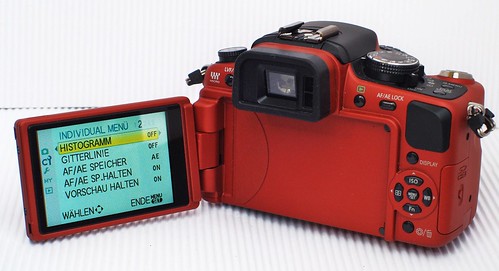Difference between revisions of "Panasonic Lumix DMC-G1"
| Line 4: | Line 4: | ||
|} | |} | ||
| − | The '''Panasonic Lumix DMC-G1''' is | + | The '''Panasonic Lumix DMC-G1''' is a mirror-less system camera and [[Panasonic]]'s first camera built around the [[Micro Four Thirds]] format co-developed with [[Olympus]]. |
The Panasonic Lumix DMC G1 is a 12.1 megapixel digital system camera for interchangeable lenses of the Mico 4/3 system. It is the first in its class from Panasonic, and in a very real sense, the first in its kind from any manufacturer. That means that it has a high-resolution electronic viewfinder showing the actual image caught by the image sensor. The finder has an ocular with diopter-correction facility. Behind the finder optics is a 900.000 Pixel extra display. The common digicam display in the camera back offers also high resolution, and it is tilt- and turnable. The camera has a moveable [[autofocus]] area. | The Panasonic Lumix DMC G1 is a 12.1 megapixel digital system camera for interchangeable lenses of the Mico 4/3 system. It is the first in its class from Panasonic, and in a very real sense, the first in its kind from any manufacturer. That means that it has a high-resolution electronic viewfinder showing the actual image caught by the image sensor. The finder has an ocular with diopter-correction facility. Behind the finder optics is a 900.000 Pixel extra display. The common digicam display in the camera back offers also high resolution, and it is tilt- and turnable. The camera has a moveable [[autofocus]] area. | ||
Revision as of 10:27, 26 September 2010
 the camera with an adapted manual-focusing Meyer lens |
 images by U. Kulick |
The Panasonic Lumix DMC-G1 is a mirror-less system camera and Panasonic's first camera built around the Micro Four Thirds format co-developed with Olympus.
The Panasonic Lumix DMC G1 is a 12.1 megapixel digital system camera for interchangeable lenses of the Mico 4/3 system. It is the first in its class from Panasonic, and in a very real sense, the first in its kind from any manufacturer. That means that it has a high-resolution electronic viewfinder showing the actual image caught by the image sensor. The finder has an ocular with diopter-correction facility. Behind the finder optics is a 900.000 Pixel extra display. The common digicam display in the camera back offers also high resolution, and it is tilt- and turnable. The camera has a moveable autofocus area.
The camera delivers fine imaging results. With appropriate diopter setting the finder image is sharp enough for exact focusing. Sometimes that kind of finder is a bit slow when accomodating to fast changing light or focus. Thus an optical finder still has an advantage. But for the amateur market it's now cheaper to produce "100%-viewfinders" of system cameras the electronical way instead in the opto-mechanical way of SLRs and DSLRs.